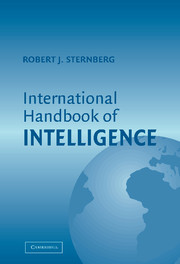Book contents
- Frontmatter
- Contents
- List of Contributors
- Preface
- 1 Intelligence Research and Assessment in the United Kingdom
- 2 Intelligence – Theory, Research, and Testing in the Nordic Countries
- 3 The Psychology of Human Intelligence in Spain
- 4 Psychology of Human Intelligence in France and French-Speaking Switzerland
- 5 Research on Intelligence in German-Speaking Countries
- 6 Is It Possible to Study Intelligence Without Using the Concept of Intelligence? An Example from Soviet/Russian Psychology
- 7 Intelligence Theory, Assessment, and Research: The Israeli Experience
- 8 Intelligence and Intelligence Testing in Turkey
- 9 Intelligence: What Is Indigenous to India and What Is Shared?
- 10 Japanese Conception of and Research on Human Intelligence
- 11 Diligence Makes People Smart: Chinese Perspectives of Intelligence
- 12 Similar Thoughts under Different Stars: Conceptions of Intelligence in Australia
- 13 Being Intelligent with Zimbabweans: A Historical and Contemporary View
- 14 Intelligence Research in Latin America
- 15 North American Approaches to Intelligence
- 16 Human Intelligence: From Local Models to Universal Theory
- Index
- References
Preface
Published online by Cambridge University Press: 05 June 2012
- Frontmatter
- Contents
- List of Contributors
- Preface
- 1 Intelligence Research and Assessment in the United Kingdom
- 2 Intelligence – Theory, Research, and Testing in the Nordic Countries
- 3 The Psychology of Human Intelligence in Spain
- 4 Psychology of Human Intelligence in France and French-Speaking Switzerland
- 5 Research on Intelligence in German-Speaking Countries
- 6 Is It Possible to Study Intelligence Without Using the Concept of Intelligence? An Example from Soviet/Russian Psychology
- 7 Intelligence Theory, Assessment, and Research: The Israeli Experience
- 8 Intelligence and Intelligence Testing in Turkey
- 9 Intelligence: What Is Indigenous to India and What Is Shared?
- 10 Japanese Conception of and Research on Human Intelligence
- 11 Diligence Makes People Smart: Chinese Perspectives of Intelligence
- 12 Similar Thoughts under Different Stars: Conceptions of Intelligence in Australia
- 13 Being Intelligent with Zimbabweans: A Historical and Contemporary View
- 14 Intelligence Research in Latin America
- 15 North American Approaches to Intelligence
- 16 Human Intelligence: From Local Models to Universal Theory
- Index
- References
Summary
A school psychologist in the United States who was seeking to assess the source of difficulties of a child with learning problems would be very likely to give the child a conventional intelligence test, such as the Stanford-Binet; a French psychologist would be unlikely to use such a test. The reason for the difference is that the two countries have different histories and current traditions with regard to the study and understanding of human intelligence. This particular pair of countries illustrates an especial irony because intelligence testing as we know it began at the turn of the twentieth century in France with a Frenchman, Alfred Binet, whereas widespread use of intelligence testing in the United States did not begin until World War I.
Some fields in psychology and other sciences have a unified history; others do not. Intelligence is one of those fields that does not. For example, French-speaking countries have traditions emanating from Binet and Piaget. English-speaking countries have traditions emanating from Spearman and Thomson (United Kingdom) and Thurstone and Thorndike (United States). German-speaking countries have traditions emanating from Wundt and later, the Gestalt psychologists. Chinese work on intelligence goes back even to before the Common Era, when ability tests were used for selection for jobs. Work in several countries in Africa reveals very different conceptions of intelligence than in Western countries.
- Type
- Chapter
- Information
- International Handbook of Intelligence , pp. ix - xiiPublisher: Cambridge University PressPrint publication year: 2004

